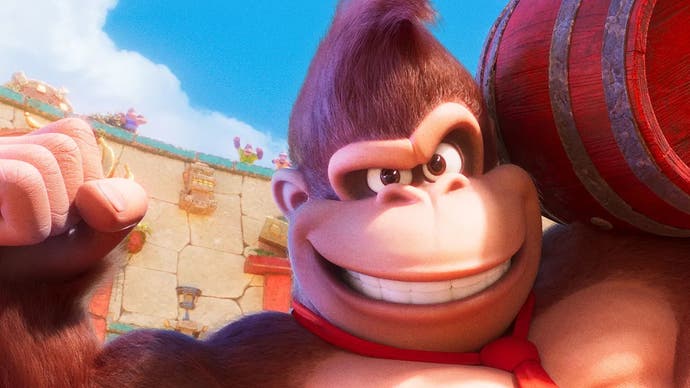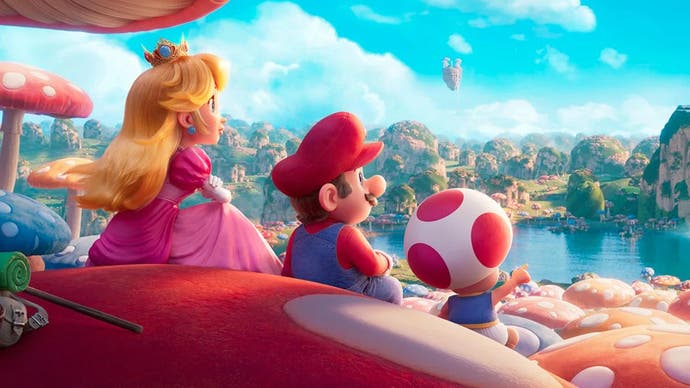Super Mario Bros. Movie review - an entertaining advert for everything Nintendo
Bowser's story inside.
It's taken 30 years, but Nintendo finally has a Super Mario Bros. movie to please the masses. As a life-long Nintendo fan, I still can't quite believe it exists - even seeing photos of Shigeru Miyamoto rubbing shoulders with Chris Pratt on the Hollywood red carpet this week felt like a bizarre collision of galaxies - and yet in this age of Sonic the Hedgehog film sequels and Mushroom Kingdom theme parks, it's simultaneously odd it has taken this long. Here we are then, with 90 minutes of bright and breezy fare bringing Mario and the gang to the big screen in an adventure which is all-action and wafer-thin on plot - just like most Mario games! - albeit with a few tantalising hints at character development buried between the constant cameos and continual laughs.
Aside from those cameos, it's almost impossible to spoil the Super Mario Bros. Movie's story, such that it is. Mario is the everyman from New York, a do-good plumber with an extended pasta-eating Italian family and little brother Luigi who he's always looked out for. The film spends longer than expected setting up Mario's Brooklyn background (accompanied by a couple of nice voice cameos from original Mario voice actor Charles Martinet), though never dares sit still for too long. Amidst several plumbing and platforming action sequences, the movie finds time to smartly acknowledge Mario's new Chris Pratt accent (which quickly settles on the ear) and hand-wave the practicalities of a plumber in pristine white gloves. Quickly, however, both brothers end up magically sucked into the Mushroom Kingdom, leaving them separated and placed on two very different paths.
The rest of the film plays out very much as you might expect, with the introduction of familiar faces like Princess Peach (a determined-sounding Anya Taylor-Joy), benevolent protector of the rather Minions-like Toads, here given enough agency to also be on her own quest: to save her realm from the invading Bowser. Joining them are Toad himself (an endearingly enthusiastic Keegan Michael-Key) and the swaggering Donkey Kong (literally just Seth Rogen). Luigi (Charlie Day) is left with a more minor role, though ultimately is given his moments to shine. The true star of the film though, by far, is the typically ebullient Jack Black as Bowser, who gets plenty of screen time as well as a family friendly Tenacious D-esque musical number, which perfectly encapsulates his comically menacing ambitions on power and expectations of Peach somehow becoming his bride.
The set-up of a sort-of love triangle between Mario, Peach and Bowser is the basis for some of the film's few real character moments, as Mario and Peach become better acquainted and get a few chances to reflect together on their individual backgrounds. Somewhat frustratingly, though, any real relationship-building is often cut short by the film's need to quickly cut to a gag for younger audiences, or what feels like a desire to save story threads for inevitable sequels. Of course, Mario games have never hinged on his home life, while Peach's own family has only had the vaguest of hints - which, bar one intriguing tease, is also about all we get here. Yes, it would have felt too odd for the Mario movie to suddenly offer some kind of canon-changing revelation, or a "we were all Mario all along"-style third wall-break akin to The Lego Movie. But for vast stretches of this film, where the characters do talk and interact in a way that's unlike most Mario games, little of substance is actually said, which is a shame.

Despite all that, though, the Super Mario Bros. Movie still ultimately succeeds. What moments we are given with Mario and Luigi, both as brothers and together as part of their initially stern family, end up servicing a predictable if no-less-thrilling finale, and an entertaining third act that has largely not already been served up in trailers and sneak peeks. The Mushroom Kingdom has truly never looked any better thanks to the technical wizardry of Despicable Me creators Illumination, or sounded any finer thanks to gorgeous orchestral reimaginings from 30 years of Mario video game history, brought to life here once again by the legendary composer Koji Kondo. And while the plot may be thin, the laughs are pretty constant, with several brilliant turns by secondary characters such as Bowser's masochistic sidekick Kamek, as well as the abruptly dark humour of the childlike Lumalee.
If you've played any Mario game (especially Mario Kart) in the past 30 years, you'll feel the warm glow of familiarity from the film's never-ending nods, references and Easter eggs to Nintendo lore - though, crucially, no prior knowledge ever felt necessary to understand what was happening on screen. Mostly I was surprised how well much of it transferred over as-is, including some smart side-scrolling action sequences and an explosive journey along Rainbow Road, plus some trickier-to-translate elements of Mario gameplay such as power-ups, which are kept largely accurate to their in-game selves.
It's been over five years since Nintendo announced its initial partnership with Universal to recreate elements of the Mario franchise in its theme parks worldwide. And while I haven't travelled to Universal Studios in Japan or Hollywood yet, watching the Super Mario Bros. Movie feels a little bit like I spent an hour or so there. It's no coincidence that parts of this film's Mushroom Kingdom look identical to the ones you can now travel to and wander around in real-life, nor that the movie's second act takes place largely in the Kong Kingdom, the next theme park area to open in Japan in 2024. And yes, I left the film ready to ditch London's grey streets and hop back into the Mushroom Kingdom myself in video game form. The Super Mario Bros. Movie is one massive advert for Nintendo's mascot and for the company's games in general - and a safe first step for what feels like a galaxy of sequels and spin-offs to follow.
We've come a long way from Bowser's brief cameo in Wreck-It Ralph, when Nintendo famously gave notes on the correct way for Disney's animators to show Bowser holding a teacup. Illumination's version of this world, made hand-in-white-glove with Miyamoto himself, undoubtedly allows for more freedom - though, perhaps unusually for Miyamoto, steadfastly refuses to upset the tea table itself. Perhaps Nintendo's caution is understandable, considering the last time Mario appeared on cinema screens. Three decades on, this film arrives as part of a vastly different era of Mario, albeit with Nintendo's mascot as entertaining as ever.



